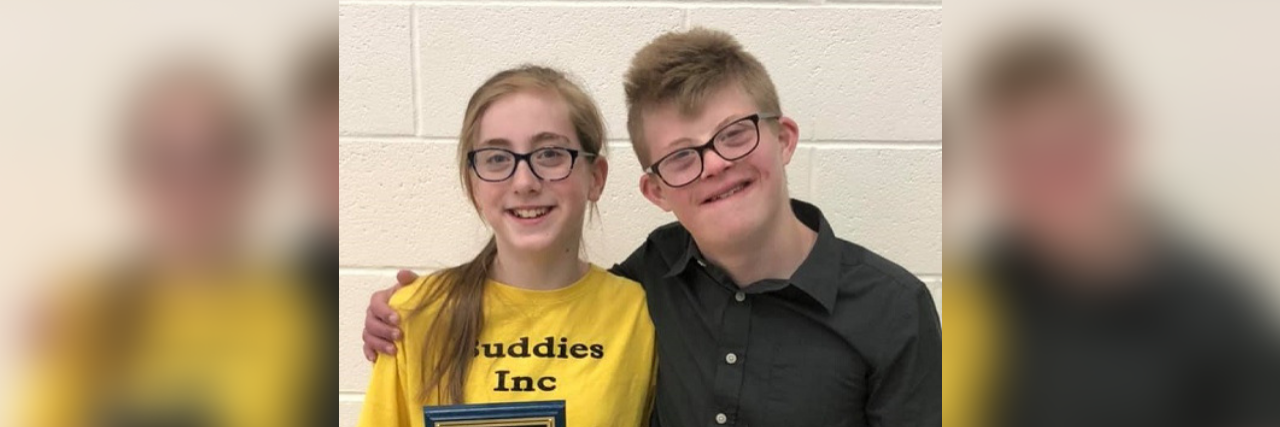Dear Parents of 'Typical' Kids, We Need You as Allies in Our Schools
As it does each year, the summer break has quickly passed and we’re now in back-to-school mode. Meetings are set, new shoes and clothes are purchased, and the excitement of learning a new schedule is beginning to escalate. The first day of school will be here before we know it.
During this frantic build-up to the new academic year, I am beginning to see the reminders on social media on how to teach our children about their peers with disabilities. These beautiful articles and essays are so important, but I think we also need to remind our adult peers how we should interact with students in our communities who need additional supports.
My oldest son, a rising freshman with Down syndrome, is so fortunate to have a strong network of friends. These friends come with supportive parents; there are adults in our community I can depend on to be an extra set of eyes in certain social and school settings. There are other adults, though, who need additional guidance on how to interact with kids like my son. While I’m absolutely certain that their intentions are good, it’s time we raise the bar and learn to be more inclusive.
Far too often, it seems like adults are speaking to my son as though he is much younger than he is. This is frustrating for him; he really wants to be seen as any other kid his age. I’ve caught him shooting me annoyed glances when someone talks to him like he’s 4 years old. Once, a well-meaning lady asked him, in that slow, high-pitched voice reserved for young children and dogs, “How are you today, buddy?” He responded, matching her tone perfectly “I’m fine, thanks.” I was first mortified but then proud, because I felt like he was sending a clear message and advocating for himself. It was obvious that at that moment, he’d had enough of the baby talk. The next time you speak to an individual with disabilities, ask yourself if you are treating them with the dignity and respect that you would expect to receive.
Along the same lines, please know that it’s not “cute” when my son participates in school activities just like all of the other kids. This past school year, when my son was talking about an upcoming basketball game, the person he was chatting with looked at me, confused. When I explained he was a member of the eighth grade basketball game, her response was, “Oh! That’s so cute.” Cute? No. Can you imagine telling another 14-year-old boy that his participation on a sports team is “cute”? Why not just respond as you would to any other kid, “Cool!” or “That’s great!” or “How’s the season going?” Because my son has a disability, she felt that this was an appropriate response. Of course, she meant no ill will with her statement, but this is certainly another example of how we can improve the treatment of individuals with disabilities in our communities.
If you notice that a school setting (like the cafeteria or playground), event (like a music program or field trip), or group (like student council) does not have any children with disabilities participating, please inquire about it. The answer could be that there wasn’t any interest among the kids with disabilities, but many times it’s because the consideration to include them just isn’t there. The, “We’ve Always Done It This Way” practices run strong through some schools, but often it only takes a bit of encouragement to make a change. It’s important that these inquiries come from all parents in the community, though, and not just parents like me. This is how we’ll create more diverse, welcoming environments for our kids.
Should you discover that your children are befriending kids with disabilities, feel proud that they are setting an inclusive example for their peers! I encourage you to offer your kids some additional coaching on how to be a good friend. My son chatters on and on about all of the friends he has at school, but we have only met a handful of these kids. As he gets older, the social opportunities are dwindling. I’m realizing that this is because kids this age set their own social calendars, and while that’s great, I do wish some would consider that my son would like to be included outside of the school day. While we are thankful for the awesome friends he does have, he often appears lonely after school hours. I’m guessing that most kids are just uncertain about how to invite him to join them at social events. Perhaps they don’t realize that he wants to be included. My husband and I have found that when we have encouraged our son to reach out to friends, they are happy to reciprocate. I believe that if more of his peers feel empowered and better understand our son’s abilities, they would feel more confident in including him at all levels, and truly being his friend. It may seem unnatural for parents to coach their older kids on how to make and keep friends, and they may not willingly accept the insights at first, but these lessons are important for all parties involved.
As parents of a student with a disability, my husband and I need more parent allies in our community in order to grow the inclusive opportunities that some take for granted. I’m willing to bet that other families like ours would say the same, regardless of where they may live. As the new school year takes off and we remind our kids to be kind to their peers with disabilities, it is the perfect time to evaluate our own behaviors. As a result, we will build better and stronger communities, which will benefit us all in the long run.

